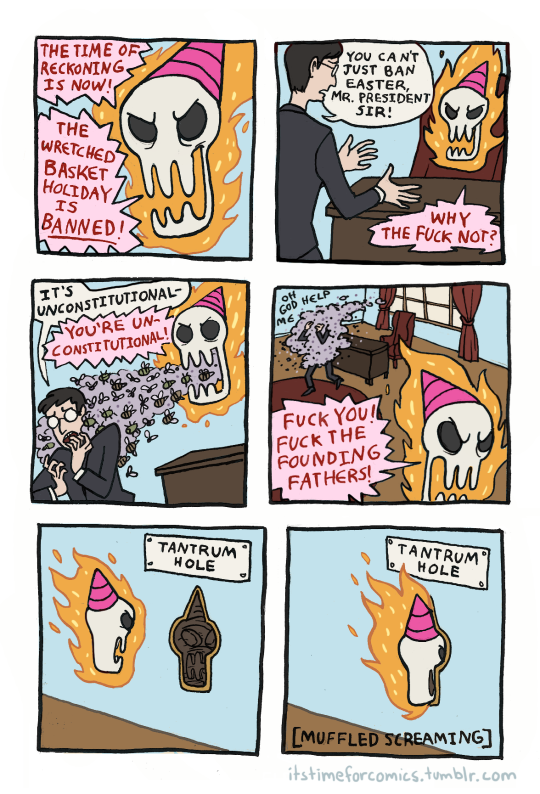Text

APRIL 2024 UPDATE: It's happening! The EXPANSION PACK is here. I've added FIVE modules (FOUR plus a short blurb on multiplayer support). Just in time for the Palestinian Relief Bundle happening right now.
CLICK HERE FOR THAT. 373 games for $8!!!!

My most popular game in all metrics now has even MORE CONTENT.
CLICK HERE TO VIEW
1. Problems Roll Tables - Need help thinking up a problem? Check out this HUGE table I've made. It's a lot!
2. Town Map and Surrounding Area - I did it in Gear Acquisition Syndrome, and I'm doing it here again! Maps! Expand out your town center and the surrounding area.
3. Address Book - Keep track of who you meet. Are they just passing through town? Do they live here with you? Keep your address book up to date.
4. Bugs and Fish - While you're out and about, you might run into a bug or see some cool fish. Maybe you become an avid fisher or bug collector! Who knows! I drew a bunch of bugs and fish for this and it was fun.
5. Multiplayer Support - Basically, you just play all together in tandem
Let me know what you think!
11 notes
·
View notes
Text
Just so we’re clear, the consensus of Tumblr seems to be that my optimal adventuring party will consist of a haunted grad student with autism, an amoral but frighteningly-competent tomb robber, and a sad robot.
I’ve never been less surprised.
28 notes
·
View notes
Text
Help me choose my party.
I am—and by extension, you are— heading to Chiron’s Doom. I cannot go alone. The game will not let me. Despite my misgivings about all of these strange rakehells, forlorn souls, mad-eyed seekers, and horrible blorbos of sundry makes and models, I cannot make the journey alone.
For slot 1 of 3, do I take:
Sparra Simms, a Grad Student from the Alienist’s Guild: She learned eye contact from a book, and is terrified that she’s doing it wrong, so she’s substituting enthusiasm for accuracy. Her robes are grounded with chokewire sigils in patterns that make my eyes water. She needs this job, because her thesis (already written) requires citations and the word of her otherworldly sponsors don’t count apparently. There is no language she cannot speak.
Bottom-Groat Gollivar, an Adventure-Capitalist (and Crux, the Alleged-Mule): Gollivar’s got an easy-going charm that shouldn’t ever exude from someone who presented a list of graves previously robbed as a resume. He’s got stuff, though, and that’s for sure. Most of it, he claims, is actually from Chiron’s Doom, and it wants badly to go back. He’ll sell some to me if I’d like. Crux, however, the not-quite-mule, crunches apples and spits out intact skins. Crux has clearly been to Chiron’s Doom before. Both of them are clearly skilled to have survived this long in their professions.
Marquis d’ Sercasso, Ovin Weems, Old Money and plenty of it: Freakishly well-equipped and startlingly intense for a person bred and raised in the lap of luxury, Ovin has already mapped the quickest route to the entrance to Chiron’s Doom and the Wellspringg beyond. They try to take my hand, tears dripping black from the corners of their kohled eyes. The dreams, apparently, started when they were named heir to Sercasso. They will find the heart of the Wellspring and Old Sercasso will rise again from the mires of the South. Magic will return to the world, and I could be a part of that. Don’t I want to be a part of that? They have more money than God.
20 notes
·
View notes
Text
9K notes
·
View notes
Text
D&D themed tex mex restaurant where you can order thac0s
#Feel free to hit the Savesalsa bar as you go to your table#Be careful with the Death/Poison its hot#and let us know if any need a refill. We've got plenty of Breath Attacks in the back.
66 notes
·
View notes
Text
Play-By-Blog #21: The Isle by Luke Gearing
Welcome to my ongoing play-by-blog of The Isle by Luke Gearing! We are playing this adventure with its original system, The Vanilla Game (adjusted somewhat to fit the format). You can check out the Play-By-Blog Repository to get all caught up if you wish.
How Play-By-Blog works:
I write up the situation, NPCs, and more, just like a DM.
You vote in the poll to help decide the character's course of action.
I roll the dice, resolve actions, and write them up next week.
So on and so forth for the rest of the adventure!
Notation:
[Text in brackets is out-of-character/GM text!] "Non-italicized quotes denote text from the original adventure!" "Italicized quotations denotes NPC dialogue."
Our character: Medon Girou - Magic Cutpurse
Our maps: The Isle, Floor 2, Floor 3
[You can use the links above to find Medon's Character Sheet and map of the Isle and the so far uncovered portions below the surface. On the Dungeon map, you are currently in Floor 3, Room 2.]
Now, back to the adventure!
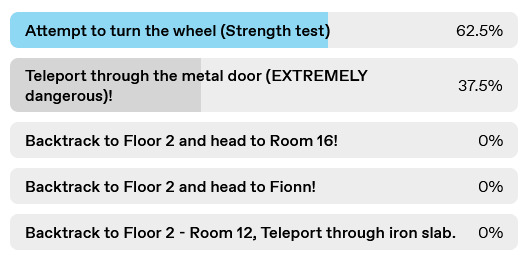
You look to the strange door and the wheeled mechanism before it. You've seen enough dangers in this place to no longer fear a door alone. You grab the wheel and twist with all your might. [Strength Check (1d20): 11 - Success!]
The mechanism twists silently as the door slides open. In the low glow of your amulet, you can see the opening beyond the door stretch off into a sizeable chamber, some of which falls beyond the reach of your light.
Before you [in Floor 3, Room 3] stand sixteen Legionaries, strange undead in banded armour, bull-horned helms, porcelain wolf masks and a heavy gold medallion imprinted with a man's face in profile. At their sides, they hold short swords and large, rectangular shields. They are immobile, statuesque in their too still stance.
Among the Legionaries are six sea-things, mutilated corpses of once cadaverous, spiny creatures filled with bioluminescent blood now scattered atop the resting water surrounding the feet of the Legionaries. A shiver runs down your spine.
To the north, a stone passage leads off into the dark. To the south, a hall leads into a partially flooded room. Before you though, stand the Legionaries.
[Sorry for the lengthy delay! I started a new full time gig here locally after our move, then I got COVID, then my wife got COVID, then I worked like 6 days in a row, and here we are now. I'm (mostly) healthy and back at it. Apologies for the delay! - Christian]
8 notes
·
View notes
Note
Depending on how Fantastical you want your Historical-Fiction Sword-and-Sandals game, there's also Lex Arcana (Acheron Games) and Thorn: City of Kings (post world games).
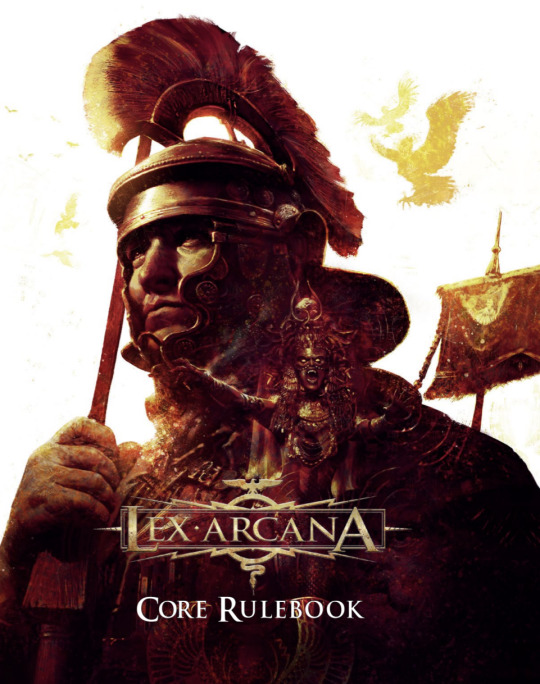
Lex Arcana casts you all as agents of an alternate history Roman Empire at its height in Late Antiquity (circa 476 CE), tasked with rooting out dangerous cults and terrifying monsters, protecting the people of the Empire. Both magic and the favor of the gods (which has an effect on player characters) are real, but the setting is otherwise grounded in history. While the core book doesn't go into any deep detail on any region, there are new books coming out at a fairly regular pace and there is one that focuses specifically on Egypt (Aegyptus).
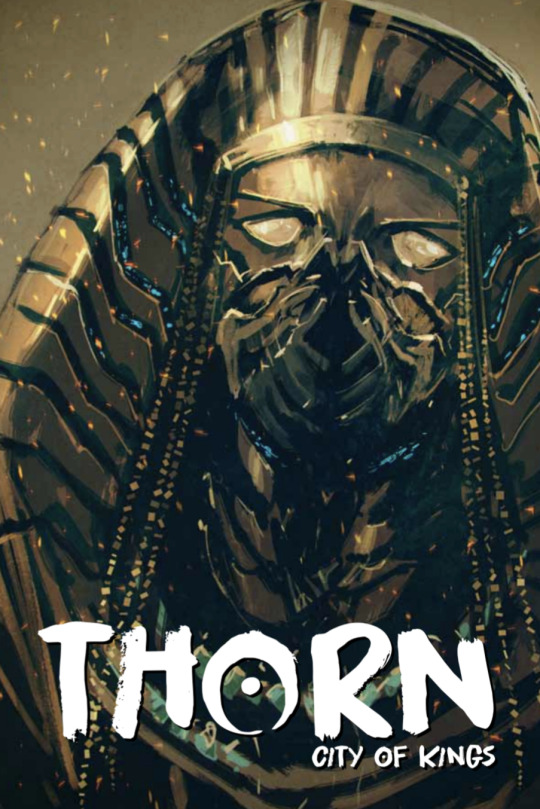
Thorn: City of Kings is set in the titular city, a fantastical amalgamation of the great cities of the late Bronze Age, sitting on the edge of collapse. It is written in such a way that it can be dropped into your system of choice, but can also be run as its own game. This one is also much closer to the standard "fantasy" milieu in terms of how ubiquitous magic is, as well as the rules assumptions (it does bill itself as an Old-School Revival game after all, though it uses dice pools instead of D20s).
Hiya! Do you know of any good rpgs for fiction in the Sword and Sandal genre, or really anything that would fit a largely-historical game set in the ancient to late antique Middle East?
Thanks for everything you do!
THEME: Sword and Sandal
Hello Friend, I don’t think I found anything here that meets what you’re looking for exactly, but I think there are a few things here that are in the same neighbourhood of what you’re looking for. I’ve found a few Bronze-Age and Mesopotamian games that might interest you, as well as a setting in Ancient Egypt!
I know that there’s not a lot here that is likely to hit the mark that you were looking for, so I’m also hoping that folks who see this will add their own suggestions in the comments and reblogs!

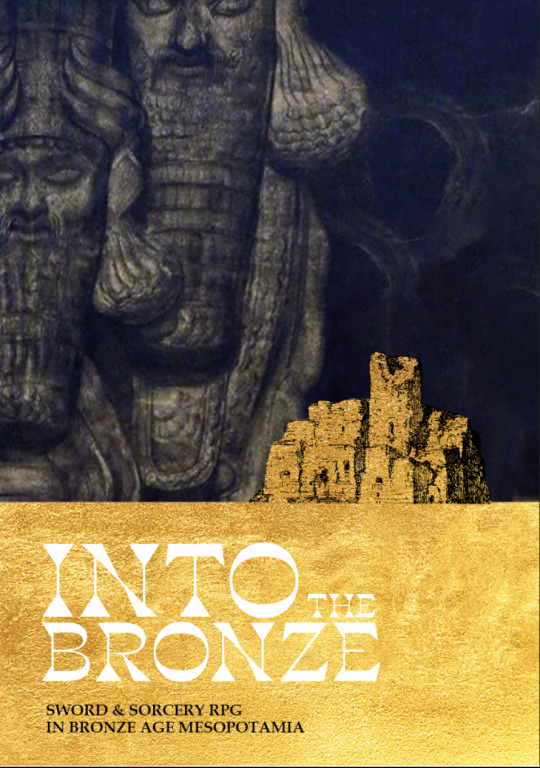
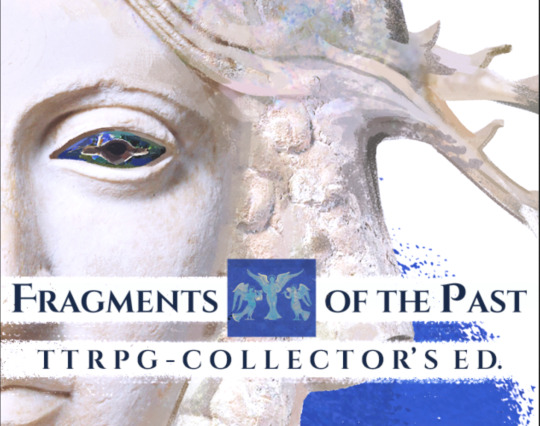
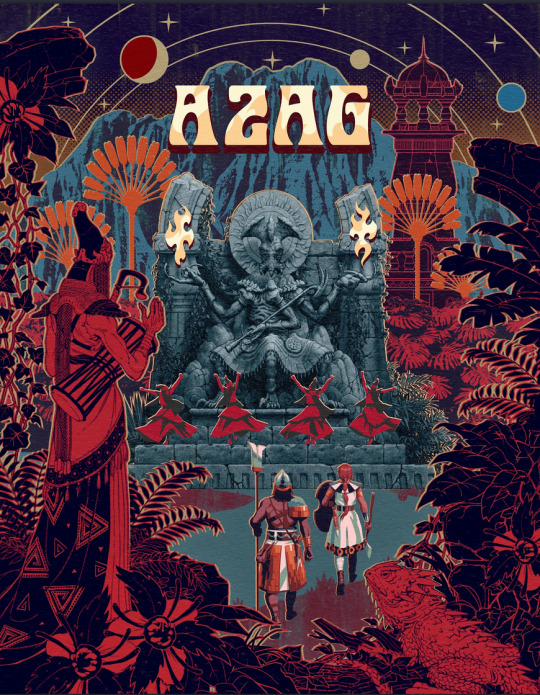
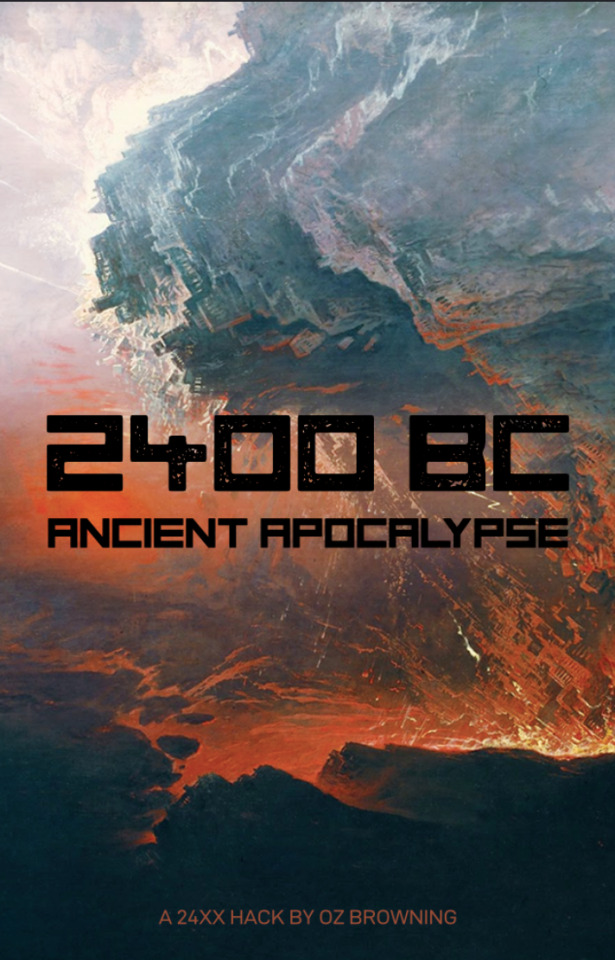
Champions of Osiris, by Zadmar Games.
“King Osiris and Queen Isis once ruled ancient Egypt—until Set murdered his brother and usurped the throne. Isis was a powerful sorceress who used her powers to escape, but Set chopped his rival into dozens of pieces and scattered them across the land, preventing his resurrection.
With the aid of her sister Nephthys, Isis recovered the remains of her husband’s loyal bodyguards and retainers, imbuing their spirits with potent sorcery and granting them immortality. These fierce heroes began the formidable task of seeking out and gathering the lost pieces of their king’s corpse.
You are the “immortal champions.” You once swore to guard your king’s life with your own—and you did! Now you’ve sworn another oath: to destroy Set’s legacy and restore Osiris to the throne.”
The Tricube Tales System is a genre-neutral rules set that is meant to be easy to learn and great for short games. The designer has created countless scenarios for this system, with Champions of Osiris being one of them. Players receive karma tokens, which they can use to increase their chances of success, and gain by increasing their chances of failure. They also have a resolve track, which erodes with each failure, potentially removing a player from the scene if they aren’t careful.
This is definitely not a historical game, but it’s probably the closest to the “Middle East” inspiration that I was able to find during my search.
Into the Bronze, by Lantern’s Faun.
Into the Bronze is a RPG of sword, sorcery and sandals in Mesopotamia from the Bronze era.
The plains between the Tigris and Ephrates rivers hide silent, gloomy valleys where demons and lesser gods devise their evil plans. Defy the gods of Sumeria, behold the beginning of civilization.
This is a rule-set, but it doesn’t have much in terms of lore, which may be good if you have the kind of world you want to play in already in your head, but just need a framework in terms of player skills and dice resolution. Into the Bronze is inspired by Into the Odd, by Chris McDowell, renowned for its flexibility and simplicity. I think it would be very easy to take characters built in this world and then put them into a world like that of Undying Sands, which isn’t a game in itself but provides you with plenty of locations, encounters, and characters to fight, barter, and conspire with.
Fragments of the Past, by Dev9k.
Fragments of the Past is a rules-light roleplaying game set in a Bronze-Age world evoking the atmosphere of ancient tales and poems of the archaic Mediterranean, where conflicts are resolved on a roll of a d10 or a d100.
Experience the great tragedies, deeds, and ambitions of larger-than-life characters, dwelling in a world of sacred places and untamed wilderness. Pray and live according to the ancient customs of long-forgotten civilizations, if you dare.
Fragments of the Past is meant to emulate mythic and tragic stories from a world that could have been, a world with references to ancient mediterranean cultures, but its locations and peoples are uniquely named. This is a world where the Gods’ wills have visible effects on the world around them: this is most visible in Talismans - relics that became powerful because of their place in great stories and actions of heroes.
This is a game designed for long-form play. Your characters are built from a mix of quantifiable stats and descriptive abilities that point to the personality and narrative arc desired by the player. As the characters grow, they will primarily manifest new Epithets, which are specific areas of knowledge born from the characters’ experiences. When rolling to actively do something using an attribute, players pick up a d100. When doing something that involves luck, hubris or willpower, the player will instead pick up a d10.
If you want to check out this game before buying it, you can check out the free Quickstart, which has over 100 pages of lore and guidance to introduce you to the basics of this game.
AZAG, by Dank Dungeons.
"You must travel far, beyond the spider-haunted towers of Byzaron and the red mists of The Yielding Plain. The Sleeping Augur awaits, through azure pylons inscribed with sigils both beneficent and doomed.”
AZAG is a combination tabletop role playing game and five track instrumental album. Featuring a rule system inspired by the likes of Fighting Fantasy and Troika! in a setting inspired by Lovecraft's Dream Cycle, Howard's Conan, and Smith's Hyperborea.
Treat with strange entities, battle against weird magics, and explore a world of mystery and wonder!
Looking at the inspiration and references for this game, as well as the rule system it draws from (Troika), I have a feeling AZAG is going to be extremely un-serious. This is not a game of historical realism, but of sorcery, action, and storage gods. Based on its source material, I”m also guessing that character creation is going to be rather simple, and survival is going to depend on your creativity more-so than the luck of your rolls. If you like your games dangerous and a little over-the-top, you might want to try AZAG.
2400 BC, by ozmodeuz.
"…at dawn a black cloud came from the horizon; thunderous with wrath. The seven judges of hell raised their torches, lighting the land with their livid flame. The earth cried despair to the heavens as daylight turned to darkness and the land was shattered like glass. For six days and six nights the tempest raged and gathered fury, and poured over the people like the tides of war. All sense and hope was lost, and the gods cowered in heaven…"
2400 BC is a hack of Jason Tocci's 24XX about rebuilding community in the aftermath of an environmental catastrophe, thousands of years in the past. It was inspired by Mesopotamian myth, particularly the Epic of Gilgamesh.
2400 BC explores a recent tragedy, devastating your homeland and driving you to fight for survival. It’s a small game that makes extensive use of roll tables to help generate characters quickly as well as provide a GM with quick ideas as to what kinds of opportunities and problems your characters will face. The character generation tables have plenty of options for making characters that aren’t necessarily good people, so I have a feeling survivability is a bit low.
All in all, if you want a quick to pick up game about catastrophe hitting the ancient world, this might be the game for you.
47 notes
·
View notes
Text
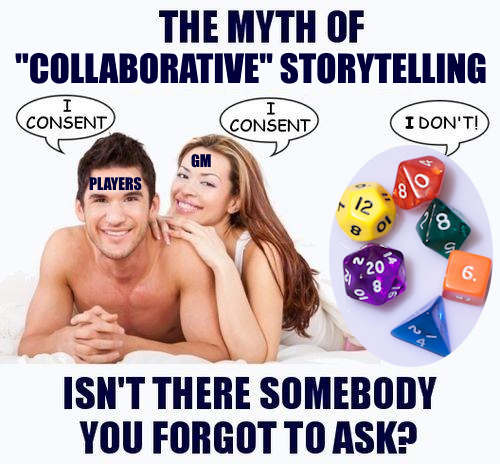
Inspired by recent discussions of an Actual Play.
19K notes
·
View notes
Text
Positioning, Market Dominance, And Having A Conversation In A Loud Room
So I'm reading Middle Earth Roleplaying 2nd ed. It's part of giant stack of tabletop I got from a publishing friend---and one of many systems I probably wouldn't be reading if I hadn't gotten it as part of a giant stack of tabletop from a publishing friend.
MERP 2e was released in '93, by Tolkein Enterprises, and is a pretty thorough book. It's packed full of nice B&W art. It lets you play as everything from a hobbit to an olag-hai. It uses a d100 system that allows for success with a complication. It's a book that feels intensely and simultaneously like it's ahead of and behind its time.
But that's not what I want to talk about.
MERP 2e has an alignment system, much like dnd at the time, but with twelve axis instead of two. Everything from whether your character is a metaphorical thinker to whether they're a literal thinker to whether they're a socialist or a libertarian is tracked.
Similarly, MERP has a classic six stat spread, but the explanations of the stats are all like "Strength(ST): Not brute musculature, but your ability to use your muscles to your greatest advantage."
And MERP has classes, called Professions, that each come with a little parenthetical explanation after their title. The Warrior's is (Fighter). The Scout's is (Thief). The Animist's is (Cleric).
What you might notice is that this is an officially licensed Middle Earth game *aggressively* defining and contextualizing itself vis a vis DnD. "Here's how our stats are different. Here's why our skill rolls are more granular. But don't worry, you can still play the same party roles. We promise we're not unfamiliar, just different."
Now, I don't know how intentionally-as-a-market-strategy the designers and writers were doing this---DnD's headlock on the industry was certainly less intense then than now---but it's reflective of a kind of design pressure that not only hasn't gone away. It's gotten way more intense.
DnD is roleplaying games. Anything that's not DnD might not be roleplaying games. Or at least, it's suspicious, it might taste weird, it might ruin your ability to have fun or speak english forever.
So in order to be a roleplaying game, you have to ask yourself "how do I fit into DnD?"
A critique I've seen leveled at indie systems sometimes is that they don't properly represent all of the three pillars of DnD. The three pillars is a modern creation. It's a 5e thing. It's specific to DnD. But DnD is roleplaying games, and to be a roleplaying game you need to be DnD.
So you get games as chameleons. You get endless "DnD killers" hoping that what people like about DnD isn't the name but the mechanics, and if you can just do the mechanics *more*, people will like you better. You get five hundred 5e splats. Power Rangers and GI Joe and Stargate all trying to fit into the same engine about swinging at and then missing a large rat. You get Adventure Time throwing out its original system and self-converting into a 5e hack because the market doesn't want things that don't look like DnD---even things that already look like DnD.
And back in '93 you get MERP 2e telling you don't worry, we still have the Thief, we just call it something different in our house.
90 notes
·
View notes
Text
The Forever Game, pt 2: What Gets to Be a Forever Game?
referencing this post
Let's talk about what counts as a Forever Game, shall we? Considering it's a term I saw once on a post I can no longer find and proceeded to formalize with Proper Noun Caps, it certainly can't prove to be a reductive taxonomy, can it?
As I mentioned in part 1, I think of Forever Games as being a type of game on its own - something with a certain approach to character design & progression, which is built with some assumption of long-term play. After all, I don't usually suggest Mage: The Awakening as a one-shot game.
This conception clearly isn't universal - a number of respondents brought up the fact that just about any game can be the one a table comes back to as their baseline, so long as they like it enough. And that's absolutely true - For the end user, any game can serve any purpose. Unfortunately, and with respect to the people who brought it up, this observation just isn't very useful for our purposes.
It's absolutely true that any game can be someone's forever game. But that's a feature of tabletop games as a medium - the fact is, at the end of the day all games take place inside our heads. This is why people use D&D 5th edition as a murder mystery game, or a tabletop-visual-novel; they understand that the fundamental mechanism of this art form is the limitless power of imagination, and are comfortable using the same rules framework every time to build whatever narrative they like, regardless of whether or not better-tailored alternatives exist.
If we want to get on the same page about Forever Games, we need to look at something concrete - like on-paper design of games themselves. That in mind, let me put forth some qualities that a Forever Game might have:
Almost certainly a trad game. While games like Wanderhome exist, the vast majority of titles I'd list as forever game candidates have a GM and probably use at least two denominations of dice.
A multi-faceted character framework. In other words, a race/class system is better suited for a Forever Game than simple Playbooks, generally speaking. This is for replayability's sake. Some folks play wizards all the time, every time - but if you've just spent five years as Slagnarr the Axinator, it might be nice to start over as a healer for the next go round.
A customizable progression track. The more a game allows you to make a capital-B-Build, the better. This is part & parcel with the above point, re: replayability, but it serves another purpose - embodying your character concept. Imagination is well and good, but there's something special about having a class feature that supports the way you want to play your character. It makes them feel more real.
At least one game mode that involves intricate mechanical interactions. The classic version of this is a grid combat system - but a crunchy exploration system or involved crafting mechanic are also good examples of this. The more rich and interesting a game's... well, game elements are, the better the game will hold up over time. Note that I don't say complex, but rich. There's a reason GURPS light is more popular than the full ruleset. Games tend to last longer when they give more of the table something to be doing at any given time, minimizing dead zones in play.
Little in the way of social mechanics. Hear me out on this - for a lot of tables, the ability to get together with friends, put on a mask, and goof off without fear of social repercussion is a huge draw. Having to do the same kinds of rules reference for politicking that you use for mosnter slaying doesn't facilitate the fantasy; it hinders freedom of play. You want the chance to fail your Will save because it creates interesting drama. The idea that you might be punished for shamelessly flirting with the King while his consort is Right There ruins the fun. A table's forever game is going to be something that lets them play casually. I don't think this is a controversial opinion; the idea of a "beer and pretzels" game is older than I am, and anyone who's been in a long-term game with friends knows how loosey-goosey things can get. I think that facilitating jokes has a solid correlation to facilitating coming back to the game.
This isn't really working towards anything. Really, I just wanted to take the opportunity of my own vagueness to elaborate a bit on what exactly I mean when I say "forever game," so if I decide to keep poking the hornet's nest, we can at least agree on whether I'm using a stick or a branch.
11 notes
·
View notes
Text
Hello!
It's the 10 Year Anniversary of Drawfee. My now fiance showed me Sad Daddy before we started dating 5 and a half years ago. I've loved them immensely ever since.
So much that I made a ttrpg inspired by them, so I'm sharing it again:
I'm incredibly proud of this. It was the game that made me make an itch.io account. It was the first ttrpg I ever felt confident enough to post.
I love drawfee a lot! If yall end up seeing this, thanks for doing this fun and cool show!
13 notes
·
View notes
Text
The Forever Game, pt 1: What the Hell am I On About?
This last week, I held a little poll for idle curiosity, and I want to talk about it. Also for idle curiosity. So this is the first of a couple of posts I'll be putting up going over my thoughts on the subject, as well as some of the responses the poll received.
I want to open up by laying out the thing I didn't to very well; that is, ask a coherent question. The phrasing I used was "Forever Games: Good or Bad?" and frankly, that's just not clear at all. Was I asking how designers felt about making them? Was I asking how players felt about them? What even is a Forever Game?
Unfortunately, there isn't a secretly very good question hiding under my poor communication. The reality is that I was looking for some pretty nebulous information, and so I got some appropriately varied answers. In lieu of clarifying what I meant, then, I think I can at least ramble for a few paragraphs about some semantics.
Thing the first: What do I mean by "Forever Game?"
The type of thing that comes to mind when I say "Forever Game" is, bluntly, a trad game. Anything that comes in hardback or with more than 200 pages. Specifically, I think of games with highly customizable character generation & progression systems. The kind of game where you can play a single character class for a 10 year campaign, start a new one with a new class, and have 10 more years of new, interesting toys to fiddle with. I could have done a better job specifying that, and I just kind of didn't. Sorry folks.
Thing the second: What exactly was I asking?
I was broadly asking two questions at once:
How do you, as a player, feel about the idea of sitting down with the same table to play in the same system as a baseline? Not as the only game you play, but as the game everyone assumes you're playing unless you've all planned something else for this month.
and,
How do you, as a designer/veteran, feel about the types of games mentioned above (a la, big, crunchy games with lots of character options)? Which is to say, how do you feel about the ones that exist currently, regardless of whether you have ever or will ever take part in making such a game yourself? In other words, give me some good old fashioned analysis and criticism of that design paradigm.
Which are really different questions, aren't they? Again, that's on me. I may decide to host each of these as separate polls in the future and see what comes of it.
5 notes
·
View notes
Text
See, having played Fiasco a lot and being vaguely aware of Ten Candles and Dread, I'd argue those could be "Forever Games" if we go by the ruleset definition. Especially Fiasco, since it is by design very hackable with different random tables and situations.
That's why my first point was that, without a tighter definition on exactly what a "Forever Game" entails, it's difficult to give a meaningful answer because we're not agreeing on the definition in the first place. Like, if me and my friends really love Fiasco, and sit down every few weeks to play Fiasco to the exclusion of other RPGs, does that make Fiasco our Forever Game? Do we have to play the same characters and archetypes every time for it to be a Forever Game, or is it just enough for us to go "We'd rather play Fiasco than D&D or Blades in the Dark?" That's what I was trying to get at. I may just be at a disadvantage from not seeing the original post though, so I may be approaching this from a completely irrelevant angle.
Murder Mystery Parties are definitely closer to Not a Forever Game though, and I'd say that things like Choose-Your-Own-Adventure books are similar, but that's because those have fixed outcomes and discrete paths and endings.
I saw a post a few days ago that got me curious. How do we feel about "forever games?" The kind of game that's built to be the thing to which a table always returns.
This isn't about any particular good or bad examples you might be thinking of - I want to know what you think about the idea of a "forever game" as a design space.
30 notes
·
View notes
Text
Without having seen the original post, I don't actually think that the question is specific enough for a meaningful for/against answer. Like, from a mechanical standpoint, pretty much any game can be a "Forever Game" as long as the group decides that it's the primary ruleset they want to use. It certainly has its advantages, as once folks have acclimated to the ruleset you don't have to repeat that for the next game. It's kind of like having a favorite genre of novel or film, where the stories all have similar conventions (rules) but are ultimately unique.
If we're talking about it on the campaign level (e.g. a single persistent world & characters that are always returned to), I think most folks will eventually move on from that specific type of Forever Game aside from some very dedicated groups. But I can see the joy in that as well.
This actually brings my mind to legacy board games, which are notably limited experiences in contrast to the replayability of normal board games. I think you'd actually have to intentionally write a game as Not A Forever Game (such as through destruction or permanent alteration of play materials, but in the digital age that's mostly on the honor system). It's as though any game is a Forever Game by the mere fact of existence and would actually have to opt out of being one.
I saw a post a few days ago that got me curious. How do we feel about "forever games?" The kind of game that's built to be the thing to which a table always returns.
This isn't about any particular good or bad examples you might be thinking of - I want to know what you think about the idea of a "forever game" as a design space.
30 notes
·
View notes


